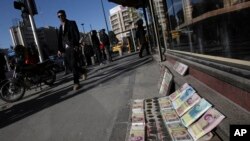Iranian investment banker Ramin Rabii says he shouted in joy when he learned that Tehran and world powers had reached a deal which promises to lift economic sanctions on Iran. Then he called colleagues to discuss the business implications.
Rabii, managing director of Turquoise Partners, a Tehran-based investment firm with about $200 million of assets under management, has been grappling for years with the results of the sanctions: unstable growth, high inflation, international banking restrictions and hard currency shortages.
The agreement on curbing Iran's nuclear program, reached on Thursday, will - if confirmed in a final deal by a June 30 deadline - begin to ease those crippling problems for Turquoise and thousands of other Iranian firms.
“We've been preparing for this moment for 10 years,” Rabii said by telephone, adding that in the months leading up to the deal Turquoise was in touch with hundreds of potential foreign investors about opportunities for them if sanctions were lifted.
He said the company now planned to develop its asset management and brokerage businesses, and would hold roadshows for investors in Europe and possibly Dubai.
Frozen out of the international banking system, its foreign trade slashed by the sanctions, Iran looks likely to become the biggest country to rejoin the global economy since post-Communist eastern Europe in the early 1990s.
The resulting boom could create tens of billions of dollars worth of business for both local and foreign companies and shift the economic balance in the Gulf, which has so far been heavily weighted towards the rich Gulf Arab oil exporting countries.
“Precautionary talks have already started between Iran and some big Western investors” in areas such as oil and autos, said Iranian-born economist Mehrdad Emadi of London's Betamatrix consultancy. “Now there will be accelerating momentum.”
He predicted annual growth of Iran's $420 billion economy would rise by as much as 2 percentage points to over 5 percent in the year after a final nuclear deal. It could accelerate further to 7 or 8 percent in the following 18 months - matching the growth of Asia's “tiger economies” during their boom years.
Iran's trade with the European Union, which totalled 7.6 billion euros ($8.3 billion) last year, could balloon 400 percent by mid-2018, Emadi said.
Banking sanctions
The complex web of financial, shipping, energy and technology sanctions woven by the United States, the European Union and the United Nations is expected to take years to remove, even if a final nuclear agreement is reached and implemented smoothly.
As a result Iran's oil exports, cut by the sanctions to about 1.1 million barrels per day from 2.5 million bpd in 2012, may not start rebounding before 2016.
But the single most damaging sanctions measure, the U.S. Treasury's use of Section 311 of the USA PATRIOT Act to identify Iran as a money laundering area, could be lifted quickly by the Obama administration, analysts believe.
This would have a big impact on trade and investment by letting foreign banks deal with Iran without fear of being targeted by U.S. officials. Iran could be re-admitted to the SWIFT global payments system, from which it was expelled in 2012, within three months of a final nuclear deal, Emadi said.
Rabii said the boost to Iranian production from easier trade would quickly spur the economy, even if big foreign investment deals took longer to arrange.
“Iranian industry is currently operating at about 60 to 70 percent capacity. Thirty percent is idle - that's because of the sanctions. Getting this working again is the low-hanging fruit of lifting the sanctions.”
The economic benefits would extend across the Gulf, particularly to Dubai, which is a traditional hub for business with Iran and has a large Iranian community.
The sanctions slashed Dubai's trade with Iran by more than a third; the emirate could now become a jumping-off point for foreign companies going back into Iran.
Airlines and logistics firms around the region also stand to profit. Tarek Sultan, chief executive of Kuwait-listed logistics giant Agility, said Iran was potentially attractive because its isolation had encouraged it to develop indigenous expertise that could allow it to leapfrog other economies.
“When the international situation is resolved and restrictions are lifted, we'll be among the first ones in there,” Sultan told Reuters late last year.
Other parts of the Gulf economy may at least temporarily be hurt by the rise of Iran. Gulf Arab stock markets are reforming themselves to attract foreign capital; Saudi Arabia plans to open its bourse to direct foreign investment within months. These markets will now have a major rival for funds in Tehran.
Any increase in Iranian oil sales could come at the expense of Saudi Arabia, OPEC's biggest producer, which has lifted its output near 10 million bpd. The kingdom already faces a record budget deficit this year because of low oil prices.





